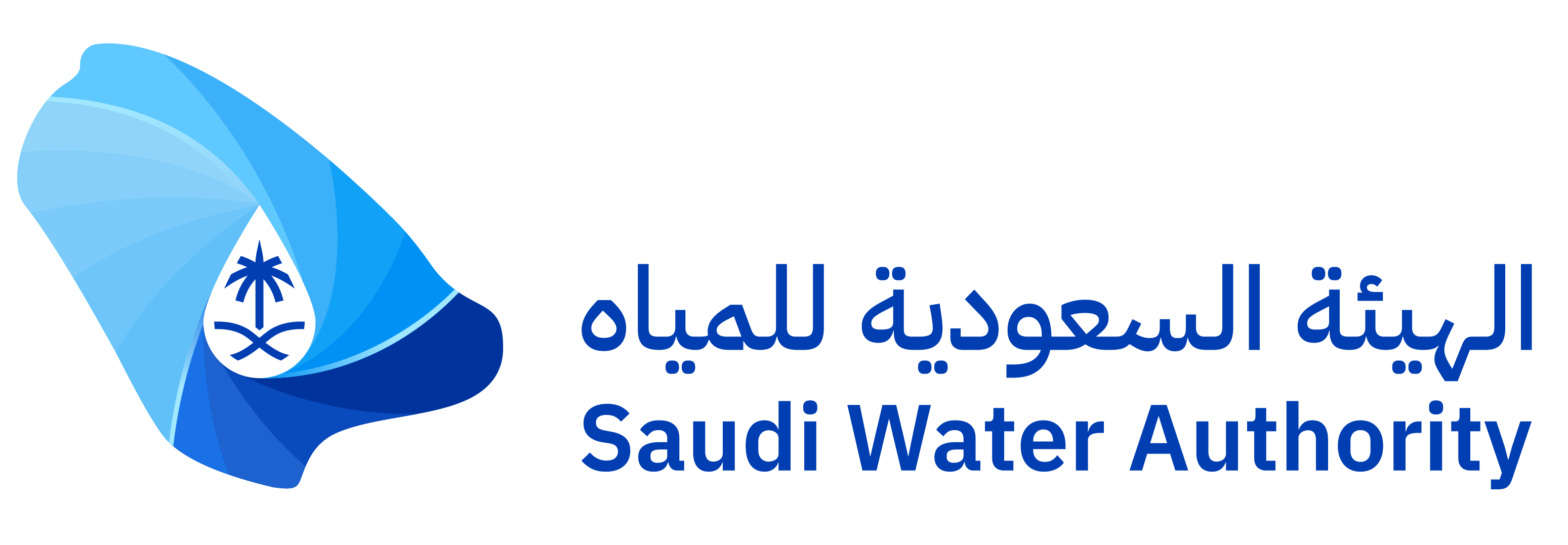About the Institute
- Home
- /
- Our Services
- /
- About the Institute
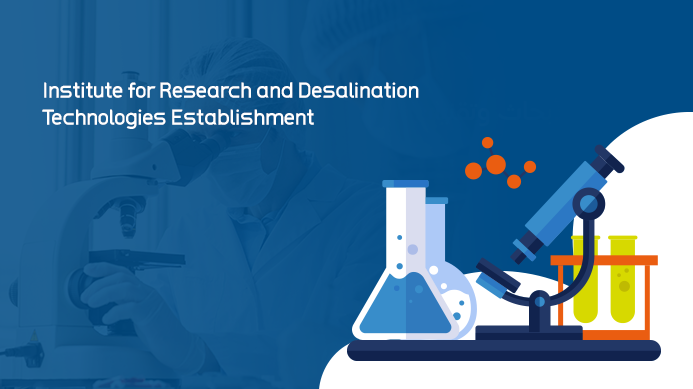
Establishment
The Research and Development Center was established in 1987. From 2007 to 2015, several key decisions were made to better enhance the Center, such as restructuring and rebranding the Center into the Institute for Research and Desalination Technologies. The Institute is the only research body across the region specialized in the desalination industry research; it seeks to reach global leadership in water technologies and lead innovation in desalination technologies, aimed at producing water in such manners that ensure sustainability, high-efficiency, low-cost, and continuum for everyone, everywhere, by 2030.
Strategies
Driven by the Center’s goals, aimed at supporting water desalination industry in the Kingdom of Saudi Arabia and beyond under the umbrella of SWCC, the Institute’s strategies are based on the following:
1- Existing Plants:
The existing plants received a lot of attention and field work by the Institute researchers along with the support of other departments in SWCC. The research Center's directions focus on increasing the production of desalination plants, reducing total costs by increasing the efficiency of desalination plants, making and optimizing the most of energy, while reducing the use of chemicals, which also aims to protect the environment.
2- Development and Introduction of Desalination Techniques:
Creativity and innovation here work in tandem, alongside continued growth, as the Institute has been working on its own effort or through partnerships with external bodies to better develop current technologies or innovate new technologies, or integrate technologies to increase efficiency and reduce overall costs.
3- Localization and Investment in the Desalination Industry:
The Institute has made unremitting and concerted efforts to well localize water desalination industry by developing technologies and localize content and manufacture processes. Of great note, a key trend of the Institute, among others, is the conversion of reverse osmosis plants from hollow membranes monopolized by a Japanese flat membrane company that is easy to manufacture and develop locally. Equally important, the Center also invested in companies by acquiring percentages from the company with which the technology was developed, or by taking fixed percentages from any project that the company undertakes in the technology developed in the future.
Services
Believing in the importance of the desalination industry development in the Kingdom, the Institute has well played its vital and pioneering role in seawater desalination research, and has further focused its research activities on applied research to enhance efficiency and to work out innovative solutions to challenges facing desalination plants, in addition to research on testing and examining materials and equipment. To this effect, the Research Institute has research, development and testing infrastructure,
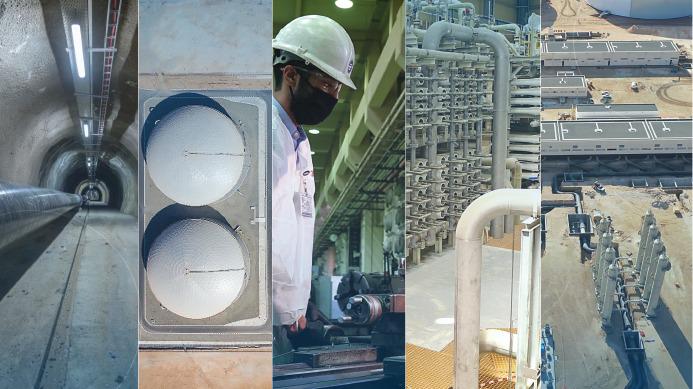
including (3) large cutting-edge laboratories equipped with the latest analysis and testing techniques: Chemistry Department Laboratories, Corrosion Department Laboratories and Department of Environment and Marine Biology Laboratories. The Institute is also equipped with (8) pilot plants covering the main desalination technologies to be used for various research and assessment purposes of different industrial materials.
Equally important, the Institute provides a wealth of services, including: analytical services that ensure the safety of the produced water in terms of chemical, microbial and physical aspects to all SWCC plants to ensure conformity with the standard drinking water specifications and standards. The Institute also provides advisory services and material assessment services for the desalination plants set into operation, and for all relevant authorities concerned with water desalination industry, against reasonable fees in accordance with agreements with existing and potential customers, remarkably committed to the values of excellence, innovation, transparency, service, cooperation, and integrity. These services include:
First: Consulting Research Studies
The Institute has attracted and hired a wealth of scientists, subject-matter experts, and technicians specializing in various technologies of water desalination, and the associated environment. With the support of the advanced equipment in the Institute laboratories and experimental stations, consulting services can be ideally and professionally at the highest standards and best practices, including scientific or environmental engineering in the following areas:
- Problems of salt deposits and sedimentation in different desalination plants, with best practices and innovative solutions suggested to address such challenges.
- Problems of corrosion of metal alloys in various desalination plants and the problems of the breakdown of some equipment with best practices and innovative solutions suggested to address such challenges.
- Problems of biological pollution resulting from the growth of bacteria and algae in water, with the recommendation of the most appropriate sterilization methods.
- Analysis of the desalination membranes and the various treatment to determine the causes and factors of failure and operational conditions contributory to such malfunctioning.
- The best methods to clean the parts of the various desalination plants.
- Environmental pollution problems for desalination plants, including air or water environment of organic and inorganic pollutants, impurities and contaminants.
Second: Assessment Projects
In a similar vein, the Institute provides assessment services of efficiency of various industrial materials before putting them into service directly on the operating units across SWCC, such as antiscalant, anti-foaming agents, corrosion inhibitors, oxygen dispersants, fuel additives and other chemicals, in addition to assessing the efficiency of coatings, desalination membranes and various primary treatment.
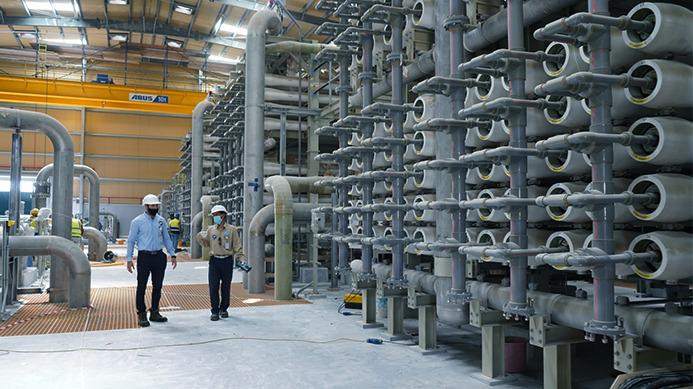
The assessment process usually takes place in three stages: (1) laboratory stage, (2) institute laboratorial plant stage and (3) commercial plant stage. When materials fail in any of these stages, the assessment process for the following stages is suspended, until the product is developed and improved by the manufacturer and then it is re-assessed accordingly. Once the product passes all three assessment stages successfully, the Institute grants the relevant company a product competency certificate that qualifies such a company to enter the competition, whether in-house or abroad.
Third: Analysis and Testing Services
The Institute for Research and Desalination Technologies has a huge collection of analyzers and testing devices that are rarely available under one roof in other research centers. The Institute, par excellence, is always equipped with the state-of-the-art technologies and high-tech laboratories not only for regular analyses and tests, but also for many advanced analyses and tests. These cutting-edge technologies are operated by a wealth of Saudi and foreign subject-matter experts, who are highly qualified to provide the best results for the most accurate analysis and testing processes.
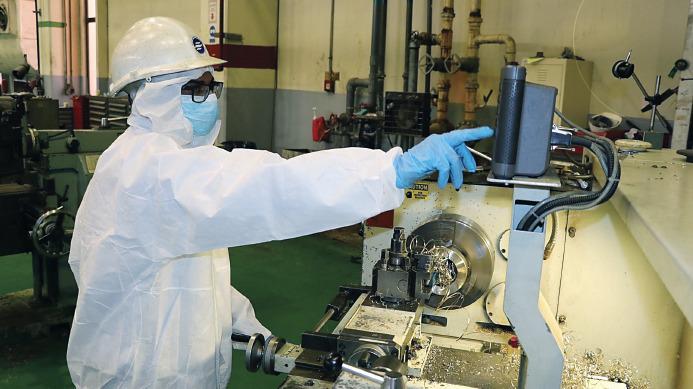
Patents
While perseverance and creativity go in full swing, the Research Institute, widely supported by subject-matter experts, scientists, staff and consultants successfully filed many patents, including:
- Desalination of seawater in a dual manner powered by nanofiltration membranes to raise the level of productivity and quality vis-à-vis traditional methods of seawater desalination.
- A dual integrated desalination system that combines initial treatment with nanofiltration membranes and the reverse osmosis desalination process has a high recovery rate and high energy efficiency.
- Seawater desalination by an integrated dual or triple method consisting of (nanofiltration) membranes with conventional thermal methods of seawater desalination with or without reverse osmosis membranes.
- A control system for freshwater evaporators and operation control methods for generation of freshwater evaporators.
- Desalination system and method to produce fresh water.
- Desalination system and method to produce fresh water of multiple design system and high efficiency groups.
- Removing boron from saline water, using nanofilms in the base treatment.
- System and method concentration return of desalination plants.
- System and method of mineralization.
- Carbon dioxide sequestration.
- Inventing a zero-saline reflux system
- Purification powered by monovalent ion technology using a multi-path (ultrafine) nanofiltration system with recycling.
Prizes & Awards
For the resounding distinction and pioneering discoveries notched up, the Institute has also received and gained many local and international awards and prizes, such as:
- The World Desalination Organization Prize 1999 for innovating a new seawater desalination method powered by nanomembranes.
- The Research Institute was awarded the Almarai Prize 2001 for creative engineering research area.
- The study "Reducing the operational cost of chemical precipitants used in flash distillation desalination plants" won the Almarai award in its second year 2002 AD, the branch of creative work in the field of chemistry.
- Award for the best innovation leading to the development of the desalination industry (Spain 2007).
- Creativity and Excellence Award at the Saudi Water and Energy Forum, Jeddah 2007.
- Prince Sultan bin Abdulaziz International Prize for Water Research, third session, 2006-2008, for developing an innovative and cost-effective method for thermal membrane desalination processes.
Newsletter
Interested in getting the latest updates about Water Conversion?
Subscribe now to the newsletter to receive all the latest news!

